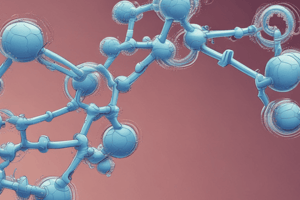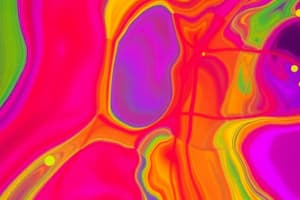Podcast
Questions and Answers
What is the primary function of hormone-sensitive lipase in lipolysis?
What is the primary function of hormone-sensitive lipase in lipolysis?
- Converting triacylglycerols into free fatty acids and monoacylglycerol (correct)
- Esterifying fatty acids to Coenzyme A
- Hydrolyzing monoacylglycerol into fatty acids and glycerol
- Facilitating fatty acid transfer across the mitochondrial membrane
Which enzyme catalyzes the phosphorylation of glycerol in the initial step of glycerol oxidation?
Which enzyme catalyzes the phosphorylation of glycerol in the initial step of glycerol oxidation?
- Acyl-CoA synthase
- Glycerol kinase (correct)
- Glycerol phosphate dehydrogenase
- Hormone-sensitive lipase
In glycerol oxidation, how many ATP molecules (net) are produced from one molecule of glycerol?
In glycerol oxidation, how many ATP molecules (net) are produced from one molecule of glycerol?
- 5
- 38
- 22 (correct)
- 12
During fatty acid oxidation, what is the direct product of beta-oxidation?
During fatty acid oxidation, what is the direct product of beta-oxidation?
Which enzyme is responsible for catalyzing the esterification of fatty acids to Coenzyme A (CoA)?
Which enzyme is responsible for catalyzing the esterification of fatty acids to Coenzyme A (CoA)?
What is the role of carnitine palmitoyl transferase I (CPT I) in fatty acid metabolism?
What is the role of carnitine palmitoyl transferase I (CPT I) in fatty acid metabolism?
In which cellular location does β-oxidation of fatty acids primarily occur?
In which cellular location does β-oxidation of fatty acids primarily occur?
What enzymatic reaction is catalyzed by Acyl-CoA dehydrogenase in β-oxidation?
What enzymatic reaction is catalyzed by Acyl-CoA dehydrogenase in β-oxidation?
What is the net ATP yield from the complete oxidation of palmitic acid (C16)?
What is the net ATP yield from the complete oxidation of palmitic acid (C16)?
Under what metabolic condition are ketone bodies primarily formed?
Under what metabolic condition are ketone bodies primarily formed?
Which enzyme catalyzes the first step in ketone body formation?
Which enzyme catalyzes the first step in ketone body formation?
What is the fate of ketone bodies produced in the liver?
What is the fate of ketone bodies produced in the liver?
Which of the following conditions is required for fatty acid synthesis to occur?
Which of the following conditions is required for fatty acid synthesis to occur?
Which enzyme is responsible for catalyzing the carboxylation of acetyl-CoA to form malonyl-CoA?
Which enzyme is responsible for catalyzing the carboxylation of acetyl-CoA to form malonyl-CoA?
How many carbons are added to a fatty acid chain during each elongation cycle in fatty acid synthesis?
How many carbons are added to a fatty acid chain during each elongation cycle in fatty acid synthesis?
Which enzyme is involved in the synthesis of both triacylglycerols and phospholipids?
Which enzyme is involved in the synthesis of both triacylglycerols and phospholipids?
What is the precursor to diacylglycerol in triacylglycerol synthesis?
What is the precursor to diacylglycerol in triacylglycerol synthesis?
What are the possible metabolic fates of the carbon skeletons of amino acids?
What are the possible metabolic fates of the carbon skeletons of amino acids?
What is the process of deamination?
What is the process of deamination?
Which type of enzyme catalyzes transamination reactions?
Which type of enzyme catalyzes transamination reactions?
Where does the urea cycle primarily occur in the body?
Where does the urea cycle primarily occur in the body?
Which two substrates are converted to carbamoyl phosphate by carbamoyl phosphate synthetase I?
Which two substrates are converted to carbamoyl phosphate by carbamoyl phosphate synthetase I?
What are the products of the reaction catalyzed by arginase?
What are the products of the reaction catalyzed by arginase?
Which amino acid serves as a precursor for the synthesis of dopamine and norepinephrine?
Which amino acid serves as a precursor for the synthesis of dopamine and norepinephrine?
Which amino acid is a precursor for serotonin synthesis?
Which amino acid is a precursor for serotonin synthesis?
Which amino acid serves as a precursor for thyroid hormone synthesis?
Which amino acid serves as a precursor for thyroid hormone synthesis?
Which amino acid serves as a precursor for heme synthesis?
Which amino acid serves as a precursor for heme synthesis?
Which of the following amino acids contribute to creatine biosynthesis?
Which of the following amino acids contribute to creatine biosynthesis?
Which amino acids are components of glutathione?
Which amino acids are components of glutathione?
What is the role of hormone-sensitive lipase?
What is the role of hormone-sensitive lipase?
In what form do fatty acids enter the mitochondria for beta-oxidation?
In what form do fatty acids enter the mitochondria for beta-oxidation?
Which step in beta-oxidation directly generates NADH?
Which step in beta-oxidation directly generates NADH?
What triggers the formation of ketone bodies?
What triggers the formation of ketone bodies?
Which enzyme converts acetoacetate to acetone?
Which enzyme converts acetoacetate to acetone?
What is the primary fate of ammonia produced during amino acid deamination?
What is the primary fate of ammonia produced during amino acid deamination?
Which enzyme is involved in the first committed step of the urea cycle?
Which enzyme is involved in the first committed step of the urea cycle?
What is the function of aminotransferases?
What is the function of aminotransferases?
Which precursor amino acid is needed for the synthesis of epinephrine?
Which precursor amino acid is needed for the synthesis of epinephrine?
Which process does NOT occur in the mitochondrial matrix?
Which process does NOT occur in the mitochondrial matrix?
Flashcards
Lipolysis
Lipolysis
Hydrolysis of triacylglycerols by lipases, releasing free fatty acids and glycerol.
Glycerol Phosphorylation
Glycerol Phosphorylation
Glycerol kinase catalyzes the phosphorylation of glycerol to form glycerol-3-phosphate.
Glycerol-3-phosphate Oxidation
Glycerol-3-phosphate Oxidation
Glycerol phosphate dehydrogenase catalyzes the oxidation of glycerol-3-phosphate to dihydroxyacetone phosphate and NADH.
β-oxidation
β-oxidation
Signup and view all the flashcards
Fatty Acid Activation
Fatty Acid Activation
Signup and view all the flashcards
Acyl-CoA Synthases
Acyl-CoA Synthases
Signup and view all the flashcards
Carnitine Palmitoyl Transferases (CPT)
Carnitine Palmitoyl Transferases (CPT)
Signup and view all the flashcards
Acyl-CoA Dehydrogenase
Acyl-CoA Dehydrogenase
Signup and view all the flashcards
Enoyl-CoA Hydratase
Enoyl-CoA Hydratase
Signup and view all the flashcards
Hydroxyacyl-CoA Dehydrogenase
Hydroxyacyl-CoA Dehydrogenase
Signup and view all the flashcards
β-Ketothiolase
β-Ketothiolase
Signup and view all the flashcards
Ketone Body Formation
Ketone Body Formation
Signup and view all the flashcards
Acetoacetyl-CoA Thiolase
Acetoacetyl-CoA Thiolase
Signup and view all the flashcards
HMG-CoA synthase
HMG-CoA synthase
Signup and view all the flashcards
HMG-CoA lyase
HMG-CoA lyase
Signup and view all the flashcards
β-hydroxybutyrate dehydrogenase
β-hydroxybutyrate dehydrogenase
Signup and view all the flashcards
Acetoacetate decarboxylase
Acetoacetate decarboxylase
Signup and view all the flashcards
Synthesis of Fatty Acids
Synthesis of Fatty Acids
Signup and view all the flashcards
Fatty Acid Synthesis Enzymes
Fatty Acid Synthesis Enzymes
Signup and view all the flashcards
Fatty Acid Synthesis Conditions
Fatty Acid Synthesis Conditions
Signup and view all the flashcards
Triacylglycerol/Phospholipid Synthesis Enzymes
Triacylglycerol/Phospholipid Synthesis Enzymes
Signup and view all the flashcards
Deamination
Deamination
Signup and view all the flashcards
Transamination
Transamination
Signup and view all the flashcards
Urea Cycle Conditions
Urea Cycle Conditions
Signup and view all the flashcards
Amino Acid Derivatives
Amino Acid Derivatives
Signup and view all the flashcards
Carbamoyl phosphate synthetase I
Carbamoyl phosphate synthetase I
Signup and view all the flashcards
Ornithine transcarbamylase
Ornithine transcarbamylase
Signup and view all the flashcards
Argininosuccinate synthetase
Argininosuccinate synthetase
Signup and view all the flashcards
Argininosuccinate lyase
Argininosuccinate lyase
Signup and view all the flashcards
Arginase
Arginase
Signup and view all the flashcards
Study Notes
Lipolysis and Oxidation of Glycerol
- Lipolysis involves the hydrolysis of triacylglycerols by lipases
- Hormone-sensitive lipase converts triacylglycerols into free fatty acids and monoacylglycerol.
- Monoacylglycerol is further hydrolyzed into fatty acid and glycerol
Oxidation of Glycerol
- Glycerol phosphorylation is catalyzed by glycerol kinase, forming glycerol-3-phosphate
- Glycerol-3-phosphate oxidation is catalyzed by glycerol phosphate dehydrogenase, which forms dihydroxyacetone phosphate and NADH
- Isomerization involves the interconversion of dihydroxyacetone phosphate and glyceraldehyde-3-phosphate
Energy Yield of Glycerol Oxidation
- Glycerol converts to Glycerol-3-phosphate which yields -1 ATP
- Glycerol-3-phosphate converts to Dihydroxyacetone phosphate which yields +3 ATP from NADH
- Glyceraldehyde-3-phosphate converts to Pyruvate which yields +5 ATP from NADH and ATP
- Pyruvate converts to Acetyl-CoA which yields +3 ATP from NADH
- Acetyl-CoA oxidation in the Krebs cycle yields 12 ATP
- Total ATP yield: 22 ATP
Fatty Acids Oxidation Stages
- Stage 1 (β-oxidation) involves the oxidation of fatty acids to yield acetyl-CoA
- Stage 2 involves Acetyl-CoA entering the citric acid cycle, producing CO₂
- Stage 3 involves electrons from oxidation passing through the mitochondrial respiratory chain to generate ATP via oxidative phosphorylation.
Fatty Acid Activation and Transfer
- Fatty acids must be esterified to Coenzyme A (CoA) before oxidation
- Catalyst: Acyl-CoA Synthases (Thiokinases) catalyzes this reaction on the outer mitochondrial membrane
Fatty Acid Activation Reaction
- Fatty acid + ATP converts to Acyladenylate + PPi
- Acyladenylate + HS-CoA converts to Acyl-CoA + AMP
Carnitine Palmitoyl Transferases (CPT)
- Carnitine Palmitoyl Transferases (CPT) facilitates fatty acid transfer across the mitochondrial inner membrane
- CPT I transfers fatty acid from CoA to carnitine
- CPT II transfers fatty acid back to CoA inside the mitochondria for β-oxidation
β-Oxidation Fatty Acids Pathway
- β-Oxidation Fatty Acids Pathway occurs in the mitochondrial matrix
β-Oxidation Steps
- Acyl-CoA Dehydrogenase creates a double bond, reducing FAD to FADH₂
- Enoyl-CoA Hydratase hydrates the double bond, forming L-3-hydroxyacyl-CoA
- Hydroxyacyl-CoA Dehydrogenase oxidizes hydroxyl to a ketone, generating NADH
- β-Ketothiolase cleaves the bond, releasing acetyl-CoA and a shortened fatty acyl-CoA
- Overall, Fatty acyl-CoA+FAD+NAD++HS−CoA converts to Fatty acyl-CoA (2C less)+FADH2+NADH Acetyl - CoA
Energy Yield of Fatty Acid Oxidation (Palmitic Acid Example)
- Palmitic Acid (C16) undergoes 7 cycles of β-oxidation, yielding 8 Acetyl-CoA
- ATP yield per cycle:
- 7 FADH₂ yields 10.5 ATP
- 7 NADH yields 17.5 ATP
- 8 Acetyl-CoA yields 80 ATP (via TCA cycle)
- Total ATP yield: ~106 ATP per palmitate
Ketone Bodies
- When glucose is scarce (starvation/diabetes), Acetyl-CoA accumulates due to low oxaloacetate levels (used in gluconeogenesis)
- Excess Acetyl-CoA is converted to ketone bodies in the liver
Ketone Body Formation
- Acetoacetyl-CoA thiolase: Condenses two Acetyl-CoA to Acetoacetyl-CoA
- HMG-CoA synthase: Adds another Acetyl-CoA to HMG-CoA
- HMG-CoA lyase: Cleaves HMG-CoA to Acetoacetate
- β-hydroxybutyrate dehydrogenase: Converts acetoacetate to β-hydroxybutyrate
- Acetoacetate decarboxylase: Converts acetoacetate to acetone, which is excreted in breath/urine
Fate of Ketone Bodies
- Ketone bodies are transported in the blood to the brain, muscles, and other tissues where they are reconverted into Acetyl-CoA for energy
Synthesis of Fatty Acid
- Synthesis of Fatty Acid occurs in the cytoplasm and requires ATP and NADPH
Synthesis of Fatty Acid Enzymes
- Acetyl-CoA carboxylase and Fatty Acid Synthase complex
Steps of Fatty Acid Synthesis
- Activation involves the conversion of Acetyl-CoA to Malonyl-CoA
- Elongation cycle: Condensation, Reduction, Dehydration, Reduction
- Fatty acids are synthesized 2 carbons at a time
Synthesis of Triacylglycerols and Phospholipids
- Enzymes: Glycerol-3-phosphate acyltransferase, Phosphatidate phosphatase
- Steps: Fatty acids are added to the glycerol backbone
- Reactions: Phospholipid precursors like phosphatidic acid are formed
Triacylglycerol and Phospholipid Synthesis
- Triacylglycerol synthesis involves Glycerol-3-phosphate + Fatty Acyl-CoA forming Phosphatidic acid, which then forms Diacylglycerol and finally Triacylglycerol
- Phospholipid synthesis involves similar steps but includes the addition of polar head groups like choline, ethanolamine, and serine
Amino Acid Metabolism
- Carbon skeletons of amino acids are converted into Glucose (gluconeogenesis), Ketone bodies, or TCA cycle intermediates
Metabolic Pathways for Amino Acid Carbon Skeletons
- Gluconeogenesis: Some amino acids are converted into intermediates of the TCA cycle and used for glucose production
- Ketogenesis: Some amino acids can form ketone bodies
- Energy production: Carbon skeletons enter the TCA cycle and undergo oxidation for ATP generation
- Fatty acid synthesis: Certain amino acids contribute to fatty acid biosynthesis
Main Metabolic Fates of Amino Acids
- Deamination and transamination
Deamination
- The removal of an amino group from amino acids, which produces ammonia and a corresponding keto acid
Transamination
- The transfer of an amino group from one amino acid to a keto acid, forming a new amino acid and a different keto acid
- Key enzymes include aminotransferases (e.g., ALT, AST)
Urea Cycle
- The urea cycle occurs primarily in the liver to detoxify ammonia, which is produced from amino acid metabolism.
Steps and Enzymes
- Carbamoyl phosphate synthetase I converts ammonia and bicarbonate to carbamoyl phosphate
- Ornithine transcarbamylase forms citrulline from ornithine and carbamoyl phosphate
- Argininosuccinate synthetase adds aspartate to citrulline to form argininosuccinate
- Argininosuccinate lyase cleaves argininosuccinate into arginine and fumarate
- Arginase converts arginine into urea and ornithine
Products of Urea Cycle
- Urea (excreted in urine) and fumarate (which enters the TCA cycle)
Conversion of Amino Acids to Specialized Products
- Amino acids serve as precursors for various specialized biomolecules
Neurotransmitters
- Tyrosine converts to Dopamine, Epinephrine, and Norepinephrine
- Tryptophan converts to Serotonin
Hormones
- Tyrosine converts to Thyroid hormones
Other Biomolecules
- Glycine is a precursor for heme in Porphyrins (heme synthesis)
- Arginine, glycine, and methionine contribute to creatine biosynthesis
- Glutathione is derived from glutamate, cysteine, and glycine
Studying That Suits You
Use AI to generate personalized quizzes and flashcards to suit your learning preferences.




